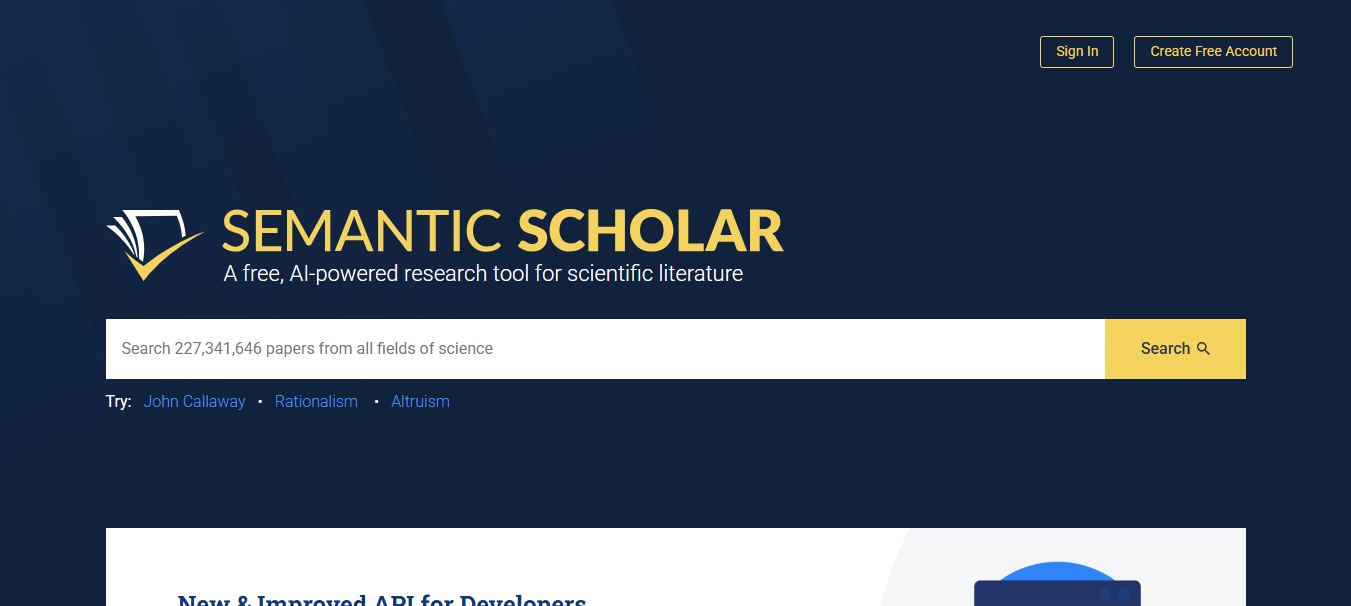Semantic Scholar
Semantic Scholar is free AI-powered research tool with 200M+ papers, TLDR summaries, citation insights, personalized feeds, and an intelligent Semantic Reader.
.svg)
.svg)
Semantic Scholar is free AI-powered research tool with 200M+ papers, TLDR summaries, citation insights, personalized feeds, and an intelligent Semantic Reader.
.svg)
.svg)

.svg)
.svg)
.svg)
.svg)
.svg)
.svg)
.svg)
.svg)
.svg)
.svg)
Semantic Scholar is a free, AI-powered academic search engine developed by the Allen Institute for AI (AI2). Launched in November 2015, it assists researchers in discovering and understanding scientific literature across various disciplines by utilizing advanced artificial intelligence techniques to extract meaningful insights and connections from academic papers.
AI-Generated Summaries (TLDRs): Provides concise, automatically generated single-sentence summaries of scientific papers directly on the search results page, facilitating quick comprehension of a paper's main contributions.
Semantic Reader: An augmented reader that offers in-line citation cards and skimming highlights, enhancing the reading experience by providing contextual information and key points of a paper.
Citation Graph Analysis: Analyzes citations and references to understand the broader context of research, helping users discover influential papers and emerging trends.
Personalized Research Feeds: Offers adaptive research recommendations based on user interactions, aiding scholars in staying updated with the latest developments in their field.
API Access: Provides developers with API access to integrate Semantic Scholar's data and functionalities into other applications or services.
Researchers and Academics: For discovering relevant literature, understanding research trends, and identifying potential collaborators.
Students: Assisting in academic studies, literature reviews, and staying informed about advancements in their field.
Educators: Accessing up-to-date research for curriculum development and teaching materials.
Librarians and Information Specialists: Enhancing research support services and integrating AI-powered tools into library systems.
Developers: Utilizing Semantic Scholar's API to build applications or services that require access to scientific literature data.
Literature Review: Streamlining the process of finding and summarizing relevant academic papers for research projects.
Trend Analysis: Monitoring emerging research topics and understanding the evolution of scientific ideas through citation analysis.
Academic Writing: Identifying key references and related work to support the development of scholarly articles.
Collaborative Research: Discovering potential collaborators by analyzing author networks and co-authorship patterns.
Educational Resource: Incorporating AI-generated summaries and insights into teaching materials to enhance student learning.
Semantic Scholar is completely free to use, offering full access to its features without any subscription or payment requirements.
vs Google Scholar: Semantic Scholar offers AI-generated summaries and a focus on semantic analysis, providing more concise insights compared to Google Scholar's broader indexing approach.
vs PubMed: While PubMed specializes in biomedical literature, Semantic Scholar covers a wider range of disciplines with AI-enhanced search capabilities.
vs Scopus and Web of Science: These are subscription-based services offering extensive citation data; Semantic Scholar provides similar functionalities for free but may have differences in coverage and indexing.
Free access to a vast database of scientific literature.
AI-generated summaries streamline literature review processes.
Advanced citation analysis aids in understanding research impact.
Personalized recommendations keep users updated on relevant publications.
Developer-friendly API for integrating research data into applications.
Coverage may not be as exhaustive as some subscription-based databases.
AI-generated summaries may occasionally lack nuance or miss subtle details.
Some features may require a learning curve for new users unfamiliar with AI tools.
Semantic Scholar is a powerful, AI-driven tool that significantly enhances the efficiency of discovering and understanding scientific literature. Its innovative features, such as AI-generated summaries and advanced citation analysis, make it an invaluable resource for researchers, students, and educators across various disciplines. By offering free access to a vast corpus of academic papers and continuously integrating cutting-edge AI technologies, Semantic Scholar stands out as a leading platform in the realm of academic search engines.
.svg)
.svg)
Lorem ipsum dolor sit amet, consectetur adipiscing elit. Suspendisse varius enim in eros elementum tristique. Duis cursus, mi quis viverra ornare, eros dolor interdum nulla, ut commodo diam libero vitae erat. Aenean faucibus nibh et justo cursus id rutrum lorem imperdiet. Nunc ut sem vitae risus tristique posuere.